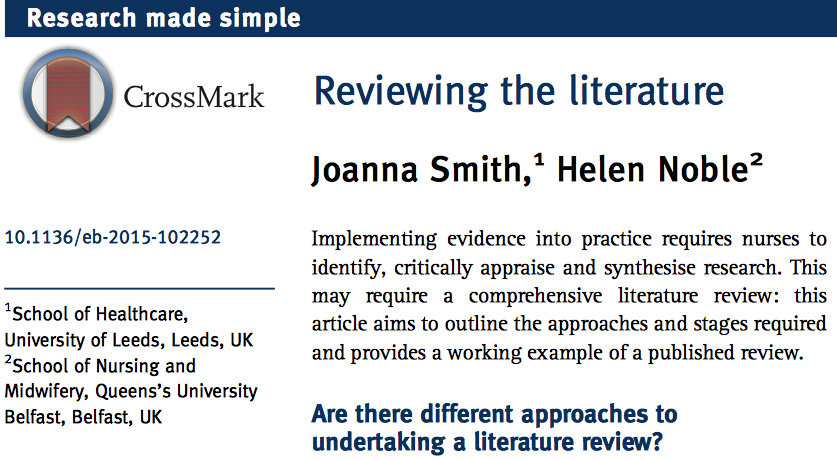Joanna Smith, Associate Editor EBN (@josmith175)
Helen Noble, Associate Editor EBN (@helnoble)
Join EBN Twitter Chat on Wednesday the 17th of January 2018, 8-9pm UK time, which will focus on the challenges of undertaking a literature review in healthcare. Participating in the Twitter chat requires a Twitter account; if you do not already have one you can create an account at www.twitter.com. Once you have an account contributing is straightforward, you can follow the discussion by searching links to #ebnjc (the EBN chat hash tag) and contribute by sending a tweet (tweets are text messages currently limited to 140 characters), you need to add #ebnjc to your tweet as this allows everyone taking part to view your tweets.
Literature reviews, in particular Cochrane systematic reviews of effectiveness, are an important resource for busy health professionals to gain knowledge about a topic & inform practice because they often make recommendations about the most effective care intervention. Systematic reviews usually adhere to clear guidance from established centers such as the Centre for Reviews & Dissemination based in the United Kingdom (http://www.york.ac.uk/inst/crd) & the Joanna Briggs Institute based in Australia (http://joannabriggs.org) & while the guidance is of value to anyone undertaking a review, it may not be the best framework for all reviews, depending on the purpose of the review. Over the past decade the range of approaches to reviewing the evidence has expanded reflecting the increased complexity of healthcare, with over 14 types of review designs identified (Grant and Booth, 2014).
Many student nurses, both under and post graduate levels of study, in their final year are required to undertake an independent study or dissertation, typically a literature review, & in general with limited resources. We have previously published a Research Made Simple article that outlined the key principles required to undertake a literature review in a structured and systemic way (Smith &Noble, 2016, http://ebn.bmj.com/content/ebnurs/19/1/2.full.pdf). However, discussions with students & colleagues suggests challenges when choosing a review design & the use the term ‘systematic review’.
The Twitter Chat will focus on the following questions:
- What types of review designs have you undertaken & what influenced your choice?
- What challenges have you experienced when undertaking a review of the literature?
- Should all systematic reviews be undertaken in association with / or be based on methods advocated by Institutes such Cochrane Collaboration or Joanne Briggs Institute?
- Is there a need to differentiate between the terms ‘Cochrane systematic review’, ‘systematic review’ & a ‘review undertaken systematically’?
Resources:
Canadian Institutes of Health Research (2008) Knowledge translation. Canadian Institutes of Health Research. http://www.cihr.ca/e/29418.html
Centre for Reviews and Dissemination (2009) Guidance for undertaking reviews in heath care, 3rd ed. CRD; York University, York.
Grant, M., Booth, A J. (2009) A typology of reviews: an analysis of 14 review typologies and associated methodologies. Health Information and Libraries Journal, 26; 91-108.
Smith, J., Noble, H. (2016) Reviewing the literature. Evidence Based Nursing, 19 (1), 2-3.


